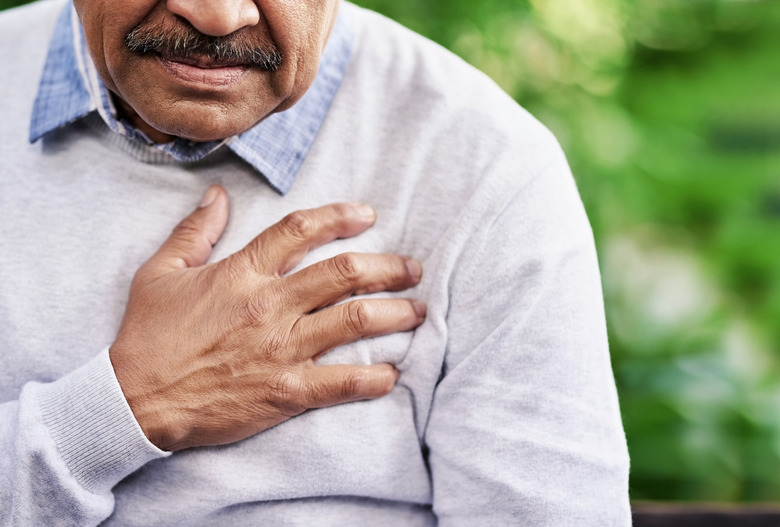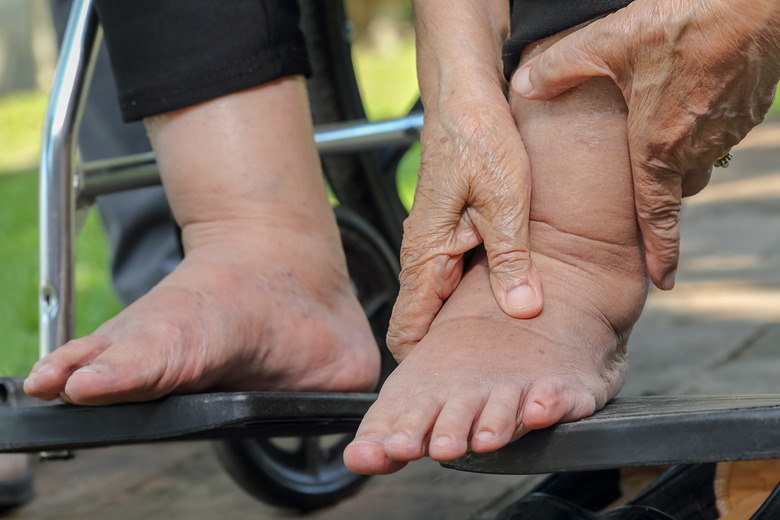Unexpected Signs Of An Unhealthy Heart
Chest pain isn't the only sign of a heart problem. Some symptoms, such as sleep apnea or chronic fatigue, are often overlooked when it comes to warning signs for cardiovascular issues. As with many underlying conditions, it's common for men and women to experience different symptoms when dealing with heart disease. And though it's important to keep an eye on some well-known signals, it's also imperative to be on the lookout for these unexpected signs of an unhealthy heart.
Neck or jaw pain
Pain in the chest and upper arm area are what most people typically associate with heart problems, but there are other points of pain that signal a similar issue. Pain in the neck or jaw is a potential point of angina — pain or discomfort when the heart lacks oxygen-rich blood. Women are more likely to exhibit these symptoms than men, but if you experience constricting pain frequently, it would be a good idea to consult your doctor.
Sleep apnea
Common symptoms for sleep apnea include loud and frequent snoring, and it can affect more than just a good night's rest. Dr. Lawrence Epstein, associate medical director for the Sleep Clinic at Harvard-affiliated Brigham and Women's Hospital, said in Harvard Women's Health Watch that sleep apnea can be a threat to a healthy heart. When people with sleep apnea experience an interruption in natural breathing, their bodies detect a lack of oxygen and force blood vessels to quickly tighten, causing a knee-jerk gasping for air. The rise in adrenaline levels can lead to high blood pressure, particularly if it's a frequent occurrence.
Shortness of breath
It's not uncommon for people to think shortness of breath is just a side effect of being completely out of shape. According to Dr. Randall Zusman, a cardiologist from Harvard-affiliated Massachusetts General Hospital, unexplained shortness of breath that occurs after small amounts of activity could indicate a heart issue. In fact, heart failure can be a condition associated with shortness of breath. One should note that "failure" does not mean that your heart stops beating or working — it means the heart does not pump blood strongly enough to meet the body's needs. Women are more likely than men to experience shortness of breath when dealing with heart troubles.
Dizziness
Feeling dizzy is by no means a symptom associated only with an unhealthy heart — it can mean many different things, like anxiety or iron deficiency. But a critical heart issue that can lead to occasional dizziness and sometimes even fainting is an arrhythmia — an abnormal heart rhythm, sometimes too quickly (called tachycardia) and other times too slowly (bradycardia), that can cause an odd and irregular flow of blood to the brain.
A persistent cough
In most cases, a cough that won't quit is not a sign of an unhealthy heart. But if you know you're at risk or if you deal with heart issues, pay special attention to the possibility that the cough could be more. Congestive heart failure can cause fluid buildup in the lungs, leading to wheezing and a persistent cough.
Swelling in feet
Swelling in the legs, feet and ankle — the kind that leaves an indentation if you press your finger into it — could signal heart failure. The swelling can be caused by a buildup of blood in the veins. Swelling can also occur after sitting for hours on an airplane, so it's important to know the difference between occasional and frequent swelling.
Numbness/coldness in limbs
If your extremities sometimes lose feeling or feel abnormally cold to the touch, it could be a sign of a heart issue. Poor circulation is often a precursor to more serious issues such as clogged arteries. If the arteries are severely narrowed, you could even experience leg pain without any exercise or movement. If blood flow stops completely — usually because of a blood clot — parts of the leg may become numb and turn pale.
Blue tint to skin color
Changes in skin color can be a sign of a heart problem, according to the American Academy of Dermatology. Similar to how extremely cold conditions can turn skin a shade of blue or purple, if an area of your skin is bluish when you're warm, it could mean that your blood isn't getting adequate levels of oxygen. Blue toe syndrome, for example, happens when one or more blood vessels are blocked.
Sweating
Sweating more than usual — especially if you aren't exercising or being active — could be an early warning sign of heart problems. If someone is sitting and suddenly starts sweating profusely, it could be a sign of an oncoming heart attack. The reason someone will likely sweat before or during an attack is because of the nervous system's "fight or flight" response.
Fatigue
Fatigue can be a symptom of the flu or any number of underlying issues. But some studies suggest that excessive, chronic fatigue can be an early indication of heart failure. Medical experts recommend talking to a doctor about the possibility of heart disease if regular tasks that used to be easy, like climbing the stairs, are becoming difficult and exhausting.
Dark spots under nails
It's normal to see some blood or bruising under your nails if you hurt your finger. However, if there are dark specks under your nails and there's really no explanation, it could be a cause for concern. According to a dermatological journal published in the U.S. National Library of Medicine, a blue or purple discoloration of the nail, also known as cyanosis, can be caused by congenital heart disease.
Muscle cramping
Muscle cramping has been shown to be a significant sign of peripheral artery disease, a buildup of plaque in the legs' arteries. According to the National Heart, Lung and Blood Institute, plaque can harden over time and close up space in the arteries, which limits the flow of oxygen-rich blood to other parts of the body and organs. If there's frequent cramping in the legs, arms or pelvis, it can mean the heart is unable to pump blood efficiently to those areas because of plaque buildup. It is treatable, so catching the symptoms early is important for your lasting health, as is eating certain heart-healthy foods like fatty fish or fruit.
Sleep disturbances
In a Harvard University survey of more than 500 women who survived a heart attack, 95% of them said they noticed something was off a month or so leading to the attack. One of those early signs was disturbed sleep, experienced by 48% of the women.
Nausea and indigestion
In the same Harvard study, nausea and indigestion were among the top 12 symptoms women reported experiencing the month before and during their heart attacks. Out of 500 women, 39% dealt with indigestion and 22% lacked an appetite.
Erectile dysfunction
There are a number of health conditions that could cause erectile dysfunction. But according to a study published in the Journal of the American Medical Association, erectile dysfunction is a signal of cardiovascular issues in some men. Studies have predicted that if a man has erectile dysfunction, it's likely he'll experience heart disease symptoms within five years. In fact, erectile dysfunction, history of smoking and genetics are equal risk factors for heart disease.
Lack of hair on legs/hair loss
Alopecia, or hair loss, can affect any part of the body, but there may be a link between a heart condition such as coronary heart disease (CHD) and hair loss on the legs. One 2018 study found that hair loss on the legs was more common in men with CHD than in those without.
Skin rash
Similar to changes in skin color, skin rashes can also be a warning sign for an unhealthy heart. According to the American Academy of Dermatology, a waxy, bumpy rash on the skin could be a serious indicator of extremely high levels of triglycerides in the blood. The bumps are fatty deposits of cholesterol and if too many of these fats are present in the blood, there could be a high risk for clogged arteries and heart disease.
Migraines
Migraines are increasingly painful and inconvenient, but they are not uncommon. Twelve percent of the population experiences migraines, but there is no definitive reason for why they happen. New research, however, is finding a potential correlation between migraines and heart issues. According to a 2018 study published in the medical journal of the American Academy of Neurology, people who experience migraines with visual aura may have an increased risk of an irregular heartbeat called atrial fibrillation. An aura is a visual disturbance that can be in the form of wavy lines, flashes of lights and blind spots, typically preceding severe head pain.
Depression
According to Harvard University researchers, not only are people with depression more prone to cardiovascular diseases, but depression is twice as likely to occur in people with heart disease than those without.
You may not be able to control everything, but you can be proactive. To try to prevent these unhealthy heart symptoms, use these cardiologists' tips for taking care of your heart.
More from The Active Times:
How Heart Attack Symptoms Are Different From Women to Men
40 Unhealthy Habits You Need to Ditch at 40
The Most Inflammatory Foods You Can Put in Your Body



















